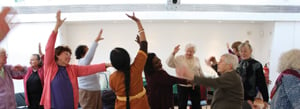Art on prescription
By collaborating with staff at local doctors’ surgeries, Dulwich Picture Gallery has found a sustainable channel for reaching out to isolated elderly individuals. Madeline Adeane explains

Now in its seventh year, the Good Times: Art for Older People programme at Dulwich Picture Gallery is going from strength to strength, addressing the needs of older adults in the community, combating loneliness, isolation and inertia through involvement in the arts. In contrast to concerns regarding the short-term, “empowerment-lite” nature of such programmes, as discussed in a recent report by the Paul Hamlyn Foundation*, this is a long-term, sustainable programme which has brought real change to the lives of the elderly and vulnerable.
According to Age Concern, more than a third of people over 65 live alone, 25% have no best friend and 17% have no contact with friends, family or neighbours. One in seven will suffer dementia and many find that loneliness and inactivity leads to further physical and mental decline. ‘Prescription for Art’ is one strand of Good Times, initiated as a response to the heavily documented number of older people in the UK who are vulnerable and at risk of isolation. The Gallery has developed a sustainable channel for reaching out to isolated elderly individuals by partnering with the general practice managers and nurses at local surgeries. Practice nurses with primary responsibility for older patients agreed to identity those they felt were feeling depressed, absorbed by their medical condition or lonely, perhaps because of recent bereavement or illness, or the responsibilities of 24 hours care for a partner. These elderly patients were ‘referred’ to creative workshops at the Gallery. The individuals do not need any art experience and the programme creates a new social life for them: it encompasses tours, lectures, creative workshops and talks, at the Gallery as well as out in the community.
Good Times now works with well over 70 partner groups of older people in the area. Prescription for Art became so successful that it has its own dedicated coordinator, along with a team of passionate volunteer helpers. All creative art sessions are free of charge to participants, and they do not cost the taxpayer a penny as the Gallery works hard to ensure that the programme does not rely on Government funding. The benefits for participants impact on mental, social and physical wellbeing. The wife of a participant with Alzheimer’s Disease was moved to write: “He never talks when we go out socially. He is frightened that he will be unable to find the right words so says nothing, whereas here he is relaxed and his conversation improves so much. These classes are just so important.” It combats the serious problem of isolation and has been described by participants as being as good as physiotherapy, with one participant poignantly stating, “you forget the pain.” In terms of the wider benefits to society, Prescription for Art provides much needed respite for families and carers and an alternative therapy for recommendation by healthcare organisations.
The Oxford Institute of Ageing selected Good Times to be the focus of a three year study. This culminated with the launch of a research publication, ‘This Is Living’, to evaluate the physical and mental health benefits observed by participants, family and staff. The publication highlights not only the benefits of the programme, with emphasis on the unique relationship with local GP surgeries, but also the unexpected outcomes, such as friendships being formed between participants. This truly is remarkable given that these are individuals who previously were reluctant to join a group. Evidence shows that the sessions alleviate symptoms of depression and provide people with a new purpose and an activity to look forward to.
By 2030 there will be approximately 1 million centenarians in the world. With our ageing population it is now more important than ever to consider the ways in which we can help improve quality of life. With an increasing amount of research underway into how the arts can positively impact on wellbeing, it seems timely to highlight the work that is going on around this. Dame Vivien Duffield DBE, Chairman of The Clore Duffield Foundation, wrote: “Research into the benefits of the arts on the wellbeing and health of older people is crucial in order to provide evidence to support further work in this field, and to raise awareness of the difference the arts can make to an ageing population.”
Programmes such as these provide inspiring examples of how art really can change lives. Wouldn’t it be fantastic to see them mainstreamed in every museum or gallery?
Join the Discussion
You must be logged in to post a comment.